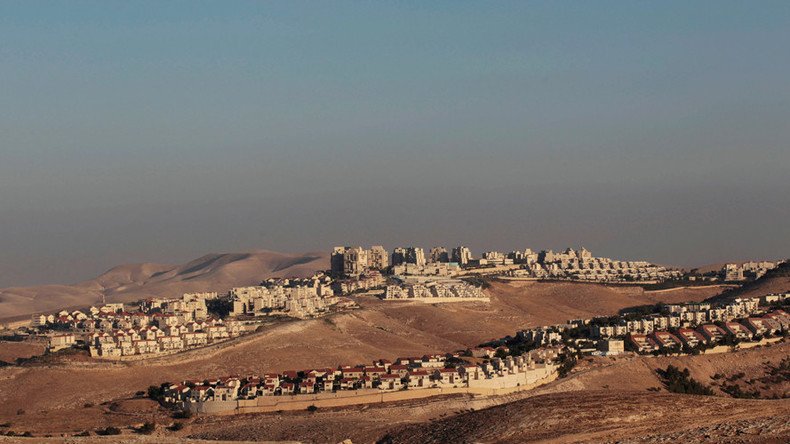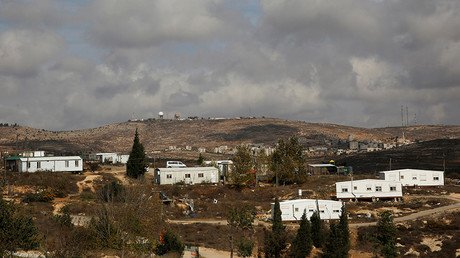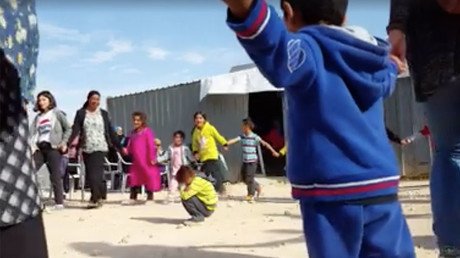Israel strikes deal with illegal West Bank settlers by moving them to ‘unclaimed’ land on same hill

Residents of a controversial Israeli outpost built on Palestinian land and ruled illegal by the Supreme Court have agreed to be given new homes in another plot of land on the same West Bank hill. Hardline critics denounced it as a “capitulation” and an “expulsion of Jews.”
Authorities have narrowly avoided a confrontation with the residents of Amona, who two years ago were given until December 25 to leave the outpost after the Israeli Supreme Court ruled that setting up the settlement on private Palestinian land illegal.
The settlers rejected the previous relocation terms and showed no signs of complying with the ruling, so the Border Force, supervised by the IDF, was preparing to remove them by force.
However, under the deal reached early on Sunday after night-long negotiations, 24 of Amona’s 40 families agreed to be moved into mobile homes on another plot of land on the same hillside.
This plot is claimed by the Israeli government under the Absentees’ Property Law.
The deal was agreed on by settlers in a vote, with 45 voting for and 25 against, with two abstentions. The government will now ask the Supreme Court for an extension of the demolition deadline in order to adequately prepare for the relocation.
“Until dawn this morning we made very great efforts to reach an agreed solution on Amona,” Prime Minister Benjamin Netanyahu said at a Cabinet meeting.
Netanyahu pointed to his government’s best efforts to settle the years-long dispute, which has become a major controversy in Israel, by saying that “there was never a government that was more concerned about the settlements and the Land of Israel than this one, and there is no government that worries about it more.”
Moreover, Israeli officials have assured the case does not mean a bad precedent for the Israeli settlements policy, which has been fueling the Israeli-Palestinian conflict and prompting international condemnation. Construction Minister Yoav Galant met with the residents and assured them that “we will build up the settlements and continue to build them throughout Judea and Samaria” – the activity considered illegal under the Oslo Accords. The Jewish Home party chairman Naftali Bennett earlier voiced hopes that the case would put the idea of a two-state solution behind altogether, as cited by the Jerusalem Post.
Meanwhile, it was clear the settlers accepted the proposal only reluctantly, with representatives of the village saying they would be up in arms again if the government fails to live up to its side of the agreement.
“We’ll keep a close watch and see if the state lives up to its promises to build homes and new public buildings in Amona,” Amona resident Ofer Inbar told Arutz Sheva. “If the state doesn’t stand by its promises, we won’t hesitate to renew our efforts on behalf of our town and all of the Land of Israel – Amona will not fall again.”
The evacuation of Amona has come under a lot of opposition, and not just from the settlers. Over the weekend a dozen IDF soldiers in the West Bank abandoned their posts, only returning after they had been convinced by their commanders they would not be taking part in the evacuation. Meanwhile over 1,000 activists, many of them teenagers and members of the radical nationalist “hilltop movement,” descended on Amona to show their support for the settlers.
When security forces previously entered Amonda in 2006 to carry out demolition work, clashes with activists left over 220 people injured. Although this time the activists have committed themselves to peaceful protest, some say they aim to continue the struggle despite the new agreement.
"He [Amona residents leader Avichai Buaron] stressed that we must not raise our hands against police officers and soldiers, but he said we definitely have to resist. There are a lot of groups of teens here. We prepared a lot of surprises to the forces," an activist told Ynet.
“We're here to burn into the collective memory harsh images of the expulsion of Jews. We won't let this pass quietly.”
The compromise with the government was criticized by right-wing figures, who felt they should not have interfered with the settlement at all.
“It's good that there was no violent evacuation in Amona – but it's unfortunate that the threat of violence works,” said Tzipi Livni of the Zionist Union, as quoted by Haaretz. “What remains of Amona isn't Zionism, settlement or any other value – just that the Israeli government caves to strongmen.”
The compromise was also criticized by Tamar Zandberg of the left-wing Meretz party, who told the Times of Israel the government “capitulated” and “danced to the tune of 40 families who have no qualms about trampling the Israeli interest and rule of law.”
However, the deal could still fall through because the land on which the settlers are being relocated is being held in “custodianship” for its absentee Palestinian owners, meaning that it could still be claimed by a private landowner. On Sunday, anti-settlement activists said they would bring forward the Palestinian owner of the new land plot.
Israeli settlements in the West Bank and other occupied territories is one of the chief contentious issues in Arab-Israeli relations. Despite the UN and international community considering it illegal under the existing agreements, Israel continues to expand its settlements in the territory, something which both the Palestinians and outside powers, including the United States, see as an obstacle to the peace process.














